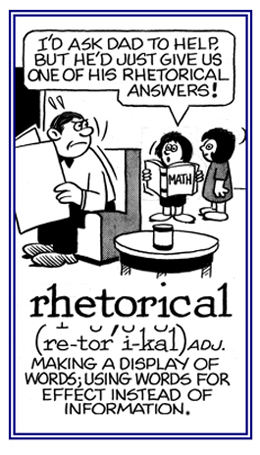rhetor-
(Greek: rhetorike tekhne, "the technique or art of public speaking" > Latin: orator; that which is spoken)
2. Sometimes, a meaningless language that is used with an exaggerated style that is intended to impress others: As a typical politician, Quincy used a lot of rhetoric but said nothing of importance; in fact, some people considered his rhetoric as nothing more than hot air, hokum, or bunk.
Mr. Jackson, the candidate, spoke with a fiery political rhetoric that was full of artificial eloquence and verbosity.
There are those who use rhetoric as a verbose, long-winded speech that is meant to impress, but usually falls flat for lack of substance or a deceitful and dishonest use of language in order to manipulate people.
3. Language that is elaborate, pretentious, insincere, or intellectually lacking serious thoughts: Ted's company made offers of compromise to the workers which were mere rhetoric because nothing was ever accomplished.Too often, politicians talk about solutions to the national debt problems, but they usually just offer rhetoric and no significant results.
4. The speech or writing calculated to arouse passion: Imogene asked the group: "Are we ever going to move from empty rhetoric to a sound plan of action on this issue?"5. Etymology: from Old French rethorique, from Latin rhetorice, from Greek rhetorike techne, "art of an orator", from rhetor, rhetoros, "orator"; related to rhema, "word"; literally, "that which is spoken".

Go to this Word A Day Revisited Index
so you can see more of Mickey Bach's cartoons.
Jerome made a speech that was punctuated by rhetorical pauses.
People should be persuaded by truth, not merely by rhetorical speeches.

Go to this Word A Day Revisited Index
so you can see more of Mickey Bach's cartoons.
Such a rhetorical question suggests that the speaker is about to offer his listeners a plan that will enable them to avoid this disastrous condition.
